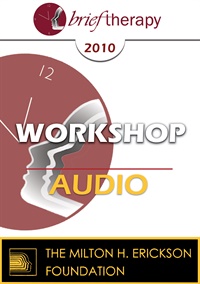BT10 Workshop 41 - Competency Based Brief Therapy - John Weakland and Richard Fisch at Work - Wendel Ray, PhD
- Average Rating:
- Not yet rated
- Topic Areas:
- Workshops | Brief Therapy
- Categories:
- Brief Therapy Conference | Brief Therapy Conference 2010
- Faculty:
- Wendel Ray, PhD
- Duration:
- 2:09:34
- Format:
- Audio Only
- Original Program Date:
- Dec 12, 2010
- License:
- Never Expires.
Description
Description:
John Weakland and Richard Fisch’s MRI brief therapy is among the most influential models of practice in use today. Original writings and clinical recordings will be used to outline Weakland and Fisch’s contributions to interactional theory and therapy. MRI Brief Therapy conceptual framework and clinical techniques for competency based brief therapy will be demonstrated.
Educational Objectives:
- Describe the basic problem formation/attempted solution framework and related concepts of Weakland and Fisch’s MRI brief therapy.
- Demonstrate a working understanding of therapeutic strategies for evoking change pioneered by Weakland and Fisch in the practice of effective brief therapy.
- Explain how to terminate treatment without termination.
*Sessions may be edited for content and to preserve confidentiality*
Outline
History and Foundations
- MRI (Mental Research Institute) was founded in 1958 by Don Jackson for Gregory Bateson's research.
- First nonprofit family therapy institute with key figures like Jay Haley, John Weakland, and William Fry.
- Don Jackson’s work, especially The Pragmatics of Human Communication, shaped family therapy.
Key Influences on Brief Therapy
- Don Jackson, Gregory Bateson, and Milton Erickson’s ideas contributed to MRI’s approach.
- Richard Fisch established the MRI Brief Therapy Center in 1965, focusing on efficiency.
- Shift from pathology to identifying strengths and effective strategies for change.
- John Weakland, Richard Fisch, and Paul Volzovic developed the first brief therapy model.
Core Concepts & Techniques
- Focus on what clients are doing to solve problems rather than the problems themselves.
- Interrupt ineffective solutions to break negative cycles.
- Brief therapy influenced solution-focused and systemic family therapy.
- Therapists help change system rules to create lasting change.
Real-World Application
- Personal example: Adjusting morning routines by interrupting ineffective solutions.
- Understanding context and relationships is key to therapy success.
- Small, incremental changes help shift interactions and behaviors.
Challenges & Ethical Considerations
- Cultural sensitivity and adaptability are crucial.
- Balancing empathy with therapist accountability.
- MRI therapy is effective in diverse settings, including prisons and hospitals.
Advanced Techniques
- Use of paradoxical predictions and positive connotation.
- Minimalist interventions for maximum impact.
- Can be combined with other therapeutic approaches.
Case Studies & Applications
- Illustrations of MRI therapy in schools, workplaces, and clinical settings.
- Engaging the person most invested in the problem for effective therapy.
- Case study: John Weakland helping a mother shift her perspective on her son’s issues.
First Session & Client Engagement
- Start with the person making the complaint to understand their viewpoint.
- Define the problem clearly and ensure client agreement.
- Respect the client’s language and frame of reference.
Therapist’s Role & Interaction
- Use body language and non-verbal communication effectively.
- Highlight exceptions to problems to shift client perspectives.
- Subtle interventions help align therapy with the client’s worldview.
Final Thoughts & Q&A
- Emphasis on thorough problem definition and collaborative engagement.
- Discussion on the practical impact of MRI brief therapy in real-world practice.
- Contact information provided for follow-up questions and resources.
Credits
Faculty

Wendel Ray, PhD Related Seminars and Products
Wendel A. Ray, Ph.D, is Hammond Endowed Professor of Education and Professor of Family System Theory in the Marriage & Therapy Program, at The University of Louisiana-Monroe (ULM). The former Director of the Mental Research Institute (MRI) in Palo Alto, California, as well as a former member of the MRI Brief Therapy Center, and the MRI Strategic Family Therapy Project, Dr. Ray continues to serve as an MRI Senior Research Fellow.


